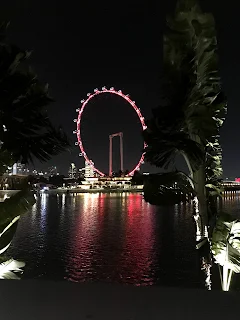Hari tu aku tengok video dalam facebook, aku tak ingat video sumber mana tapi aku ingat antara periuk yg selamat kita masak ialah :
1. Ceramic
tapi bukan ceramic coating. so ada beza. antara ceramic dengan ceramic coating. so aku pikir balik periuk aspen yg aku beli dr coway tu apa pulak. ceramic atau ceramic coating
2. Glass
ini merujuk kepada corningware dan kawannya tu apa dia yg dr kaca tu sebab takde mengeluarkan apa apa bahan kimia, jangan guna periuk dr aluminium dan teflon. yg teflon ni banyak juga merata kedai harga pun murah
3. Stainless steel
Disarankan guna stainless steel ni mmg aku pakai sebab aku guna induction cooker hanya boleh detect stainless steel mmg elok .
4. iron cast .
aku baca periuk Le cruset yg diperbuat dr iron cast ni
mmg rezeki korang aku jumpa versi asal articles ni
https://brightside.me/inspiration-tips-and-tricks/4-types-of-toxic-cookware-to-avoid-and-4-safe-alternatives-510710/
1. Ceramic
tapi bukan ceramic coating. so ada beza. antara ceramic dengan ceramic coating. so aku pikir balik periuk aspen yg aku beli dr coway tu apa pulak. ceramic atau ceramic coating
2. Glass
ini merujuk kepada corningware dan kawannya tu apa dia yg dr kaca tu sebab takde mengeluarkan apa apa bahan kimia, jangan guna periuk dr aluminium dan teflon. yg teflon ni banyak juga merata kedai harga pun murah
3. Stainless steel
Disarankan guna stainless steel ni mmg aku pakai sebab aku guna induction cooker hanya boleh detect stainless steel mmg elok .
4. iron cast .
aku baca periuk Le cruset yg diperbuat dr iron cast ni
mmg rezeki korang aku jumpa versi asal articles ni
https://brightside.me/inspiration-tips-and-tricks/4-types-of-toxic-cookware-to-avoid-and-4-safe-alternatives-510710/
1. Teflon cookware
Teflon is probably the biggest offender on this list — many people choose this non-stick material because it’s convenient and ubiquitous. It’s also the most dangerous.
The non-stick properties of Teflon cookware are achieved with a coating of PTFE (polytetrafluoroethylene), which is a plastic polymer that starts to leach toxins when heated above 572 degrees Fahrenheit. These toxic fumes lead to flu-like symptoms called polymer fume fever, informally known as Teflon flu. They’re not only dangerous to people, but they’re also fatal to pet birds, like parrots.
Another chemical compound found in Teflon cookware is PFOA (perfluorooctanoic acid), which has been linked to several types of cancer including breast, prostate, and ovarian cancer. While it’s believed that PFOA is present in Teflon products in such small amounts that it poses no risk to humans, it’s worth noting that it’s also found in many other everyday things. That’s why it’s best to limit your exposure to it wherever possible.
Other coated non-stick cookware might be PTFE and PFOA-free (such as granite), but it’s only safe to use while the coating is intact. The coating is thin and chips easily. Once chipped, all use of that cookware should be stopped immediately after.
Try this safe alternative instead: real cast iron cookware. This is a safe cooking option that truly withstands the test of time. It heats well and very evenly, and can even be seasoned to make it non-stick. It doesn’t leak anything toxic into your food and is actually a good natural way to increase your iron levels. If your iron levels are fine, you can try enameled cast iron cookware, which is just as safe and convenient to use.
2. Aluminum cookware and aluminum foil
It’s no surprise that the use of aluminum is so widespread — besides being the most abundant metal, it’s also very strong, lightweight, versatile, and recyclable. However, it’s not without hidden dangers.
Aluminum is a neurotoxic metal. Elevated aluminum levels have been linked to several central nervous system diseases, including Alzheimer’s and ALS. Though aluminum cookware is usually coated, the coating is prone to chipping, releasing the toxic metal into your food.
3. Copper cookware
You may have seen copper cookware in stores and noticed how pretty it was. You may have also heard about its conductive properties, which allows for quick and even heating. But do you know that copper can actually be dangerous when used in cookware?
Like some other heavy metals, copper is very important for human health in small quantities. But an excess amount of it in the body can lead to heavy metal poisoning. When copper cookware isn’t coated, it can release copper when cooking acidic foods. And when it’s coated, the coating often contains nickel, which is another toxic element.
Try this safe alternative instead: stainless steel cookware. This is a great option — it’s relatively lightweight and resistant to scratches, and can be seasoned to make it non-stick! It will also last you a long time. Just make sure you’re buying food-grade stainless steel — this type doesn’t contain any nickel or chromium.
4. Ceramic-coated cookware
Ceramic-coated cookware looks nice and seems like a safe option at first. After all, 100% ceramic is completely safe for cooking purposes. However, a coating of ceramic is usually hiding bad materials.
The soft ceramic coating isn’t the most durable and starts chipping after several months of everyday use. When that happens, lead and cadmium that is sometimes found in the coating will end up in your food and later in your body. Lead poisoning is one of the most dangerous types of metal poisoning and can result in abdominal pain, headaches, infertility, and other health complications (and in severe cases, coma and death). Even when the coating is lead-free, chipped cookware can still present dangers — it’s usually neurotoxic aluminum that’s under the ceramic coating.
Try this safe alternative instead: 100% ceramic cookware. This is one of the best and safest options around since it’s made with completely natural materials, isn’t toxic and won’t chip or peel off. It’s also non-stick and can be washed in the dishwasher. Its only con is that 100% ceramic can be pretty costly, but it will last you a long time.









































